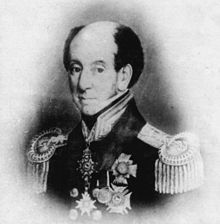Sir Gordon Bremer | |
|---|---|
 | |
| Birth name | James John Gordon Bremer |
| Born | 26 September 1786 Portsea, Hampshire, England |
| Died | 14 February 1850 (aged 63) Tunbridge Wells, Kent, England |
| Allegiance | United Kingdom of Great Britain and Ireland |
| Service | Royal Navy |
| Years of service | 1802–1850 |
| Rank | Rear-Admiral of the Blue |
| Commands | East Indies and China Station |
| Wars | |
| Awards |
|
| Signature |  |
Sir James John Gordon Bremer KCB KCH (26 September 1786 – 14 February 1850) was a British Royal Navy officer. He served in the Napoleonic Wars against France, the First Anglo-Burmese War in Burma, and the First Opium War in China.
Born in Portsea, Portsmouth, Bremer joined the Royal Naval College as a student in 1797. He became a midshipman in 1802, serving in the North Sea, then qualified as a lieutenant in 1805. The first ship he commanded was HMS Rattlesnake in 1807, stationed in the East Indies. He was promoted to post captain in 1814. After becoming commander of HMS Tamar, in 1824 he was sent to Melville Island, Australia, to establish a colony. Under his leadership, the north coast of Australia from 129° to 135° longitude was claimed as British territory. The colony was abandoned in 1828. He led British forces at the Battle of Berbera in 1827, a successful raid against tribes in the Horn of Africa.[1]
As a commodore, Bremer was the temporary commander-in-chief of British forces in the First Opium War, for two periods between 1839 and 1841. In 1841, he took possession of Hong Kong Island for the United Kingdom. From 1846 to 1848, he was joint commander (with Francis Augustus Collier) of the Channel Squadron and superintendent of Woolwich Dockyard. He retired in 1848, with the rank of rear admiral, and died in 1850.
- ^ James Marshall (1832). Royal Naval Biography : Or, Memoirs of the Services of All the Flag-officers, Superannuated Rear-admirals, Retired-captains, Post-captains, and Commanders, Whose Names Appeared on the Admiralty List of Sea Officers at the Commencement of the Present Year, Or who Have Since Been Promoted, Illustrated by a Series of Historical and Explanatory Notes ... with Copious Addenda: Captains. Commanders. Longman, Hurst, Rees, Orme, and Brown. p. 438.